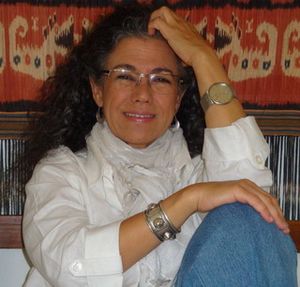Smadar Lavie facts for kids
Quick facts for kids
Smadar Lavie
|
|
|---|---|
| סמדר לביא | |

Smadar Lavie
|
|
| Born | March 5, 1955 |
| Education |
|
| Employer | University of California, Davis |
| Scientific career | |
| Thesis | The Poetics of Military Occupation: Mzeina Allegories of Bedouin Identity under Israeli and Egyptian Rule |
Smadar Lavie (born March 5, 1955) is an Israeli author, activist, and anthropologist. An anthropologist is a scientist who studies people and their cultures. She is a Mizrahi Jew, which means her family comes from Middle Eastern or North African Jewish communities.
Lavie is an expert on the cultures of Egypt, Israel, and Palestine. She focuses on issues of fairness related to race, gender, and religion. She is a professor emerita, which means she has retired but keeps her title, from the University of California, Davis.
Contents
Education and Career
Smadar Lavie began her university studies at the Hebrew University of Jerusalem, where she earned her first degree in 1980. She then moved to the United States and earned her Ph.D. (a high-level degree for experts) in anthropology from the University of California, Berkeley in 1989.
Her final research project for her Ph.D., called a dissertation, was about the Bedouin people living in the Sinai Peninsula. This work won an award for being an outstanding study.
In 1990, Lavie started teaching at the University of California, Davis. Over the years, she has also been a visiting professor at many other well-known schools, including Stanford University, the University of Virginia, and the University of Minnesota. She has received many honors that allowed her to live and work at special research centers around the world.
Famous Books and Awards
Dr. Lavie has written important books based on her research. Her work has earned her several awards.
Key Writings
- The Poetics of Military Occupation (1990): This book was based on her award-winning Ph.D. research. It received an honorable mention from the Victor Turner Award for Ethnographic Writing, which is a prize for books that clearly describe different cultures.
- Wrapped in the Flag of Israel: Mizrahi Single Mothers and Bureaucratic Torture (2014): This book explores the challenges faced by single mothers from Mizrahi backgrounds in Israel. It received an honorable mention from the Association of Middle East Women's Studies and was a finalist for the Clifford Geertz Book Award.
Major Awards
- Gloria Anzaldúa Prize (2009): She won this award for an article she wrote about crossing the border between Palestine and Israel.
- "Heart at East" Honor Plaque (2013): Lavie received this award for her lifetime of work helping Mizrahi communities in Israel.
- Fulbright Scholar (2022): She was chosen for this respected program to teach and research at Vilnius University in Lithuania.
Activism and Social Justice
Besides her work as a professor and author, Smadar Lavie is also an activist. An activist is someone who works to bring about political or social change. She is a member of many groups that fight for women's rights, peace, and an end to racism.
Here are some of the ways she has been involved:
- She helped start a group at Berkeley that supported academic freedom in Israeli-occupied territories.
- She has been a leader in Ahoti (Sister) for Women in Israel, a feminist organization for women of color in Israel.
- She is a member of the Mizrahi Democratic Rainbow Coalition, a group that works for the rights of Mizrahi Jews in Israel.
- She is a member of Jewish Voice for Peace, an organization that promotes peace and human rights.
Through her activism, Lavie works to make society fairer for everyone, especially for women and minority groups in Israel and Palestine.
Selected Publications
Books
- Creativity/Anthropology. With Kirin Narayan and Renato Rosaldo. Ithaca: Cornell University Press, 1993.
- Displacement, Diaspora, and Geographies of Identity. With Ted Swedenburg. Durham: Duke University Press, 1996.
- Wrapped in the Flag of Israel: Mizrahi Single Mothers and Bureaucratic Torture. New York: Berghahn Books, 2014. A revised edition was published in 2018 by the University of Nebraska Press.

